
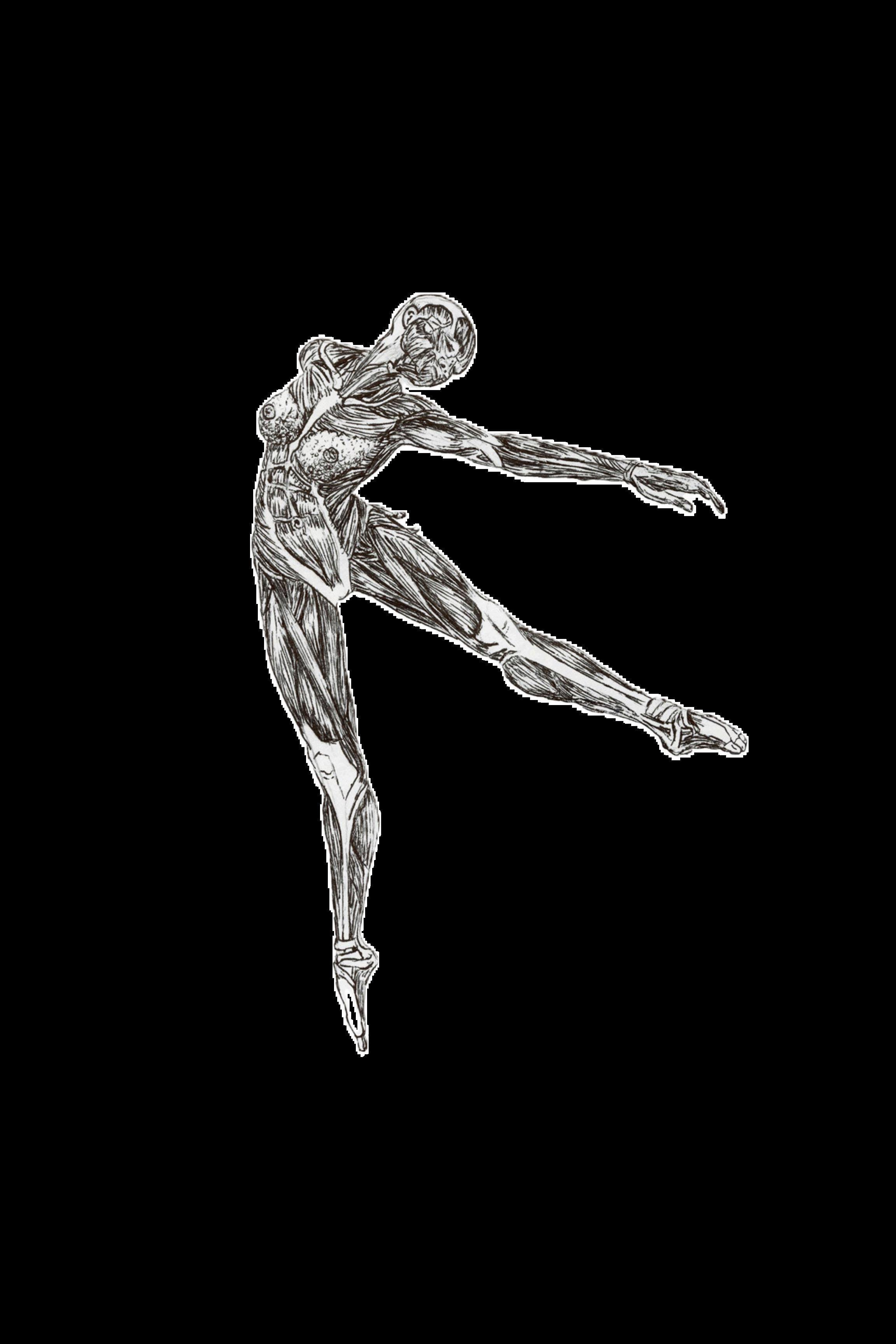
E A W 52
Cover Images by Rachel Heinrich
Front Cover: Structure of Dance: Her Solo
Back Cover: Structure of Dance: The Duet

Volume 52, 2024 ONEOTA REVIEW THE Volume 52, 2024 ONEOTA REVIEW THE
Mia Irving
Ashley Imdieke Editors
Editorial Board
Ethan Kober
Margaret Mullin
Sea Orme
Scott Rust
Eleanor Van Fleet
Faculty Advisor
Lise Kildegaard
Editor’s Note
Thank you to all of the students that have submitted their work to the Oneota Review this year. This magazine is not possible without your creativity and talent!
We want to thank each and every one of wonderful board members for all of the input and feedback they have given us.
We want to thank our readers for their engagement in this magazine, and to everyone who has waited in excitement for it to be published.
Lastly, we want to thank our amazing advisor, Lise Kildegaard, for all her wonderful guidance and enthusiasm. She has served as the faculty advisor to the Oneota Review for 10 years, and we wish her the best in the next chapter of her life!
Table of Contents
Poetry
Asphodel Iowa by Rory Wisgerhof
The Riverbank by Maggie Bruck
Reflections of a Camp Counselor by Britta Elsbernd
Creating a Home by Sorley Swanstrom-Arnold
Temporary Goose by Ethan Kober
Pinocchio Gets Dressed by Sea Orme
In the Real Early Morning by Marina Beachy
Window Boy by Joey Maiden
In Which the Prince was a Constellation by Sea Orme
Full Tomato by William Ode
Astronomical Love by Elijah Lehmann
In the Company of a Rose by Ashley Imdieke
The Garden by Joey Maiden
Why is it called a period if mine has no end? by Anna Stenerson
Eggs by Mia Irving
Woman I am by Maggie Bruck
The (Sound) Waves of the Weekend by Elijah Lehmann
Accompaniment by Margaret Mullin
Slouching Towards Bethlehem by William Ode
The earth lets go by Rachel Tully
1 2 4 5 6 10 11 16 21 22 23 24 25 26 27 29 31 32 37 38
Short Stories / Essays
Dorothy by Eleanor Van Fleet
Jante by Grace McIlrath
Anne & Sylvia by Eleanor Van Fleet
A Pilgrimage by Elijah Wallace
Freefall by Britta Elsbernd
Phelps Park Bridge by Michael Burns
Late Night Decorah by Michael Burns
Seated Studies by L'Engle Charis-Carlson
Fog over the Pasture by Grace McIlrath
Questions by Mattie Snyder
Self Portrait in a Mirror by L'Engle Charis-Carlson
If You Were Here... by Ashley Imdieke The Golden Glow by Ava Shively
Songs / Videos
Friends From Home by Thomas Hadley
/ Artwork
Photography
Pleasant Night Out by Ava Shively 8 12 34 39 3 7 14 15 17 18 19 20 28 30 42 42 Accountability by Gretchen Christine
Rory Wisgerhof Asphodel Iowa
It is a slow and wicked thing, my cardinal summer.
Time passes incomprehensibly
Hours tick by slowly, like sap turning to amber
Until somehow, someway, the week begins anew Or rather, lays atop the previous week that has never really ended, Like the constantly growing layer of limestone dust That you can never truly wash away..
The grasses brown under the relentless fury of the sun
Even the prairie roses bake and wilt under its ire
To walk anywhere would be a plea for death, So the only traffic comes from old shuddering pickups
Dented wheel wells burning, cooling units choking
Tires scrabbling for purchase on gravel like they too, are unsure of their purpose.
With each passing day, as the sun unleashes its wrath on the fields below
In memory of a long-ago razed prairie
The old barn long widowed of its cupola and stained red-gray with age Is leaning, leaning, leaning more
Until one day, the great wooden beast will finally give up And with it, the rest of the town.
It is a Godless thing, my cardinal summer.
1 Table of Contents
The Riverbank
Maggie Bruck
my hot, red skin dries up the river the way the sun evaporates a tear when we see the riverbank once again, the reeds have settled and the water has cleared like some muddy tallgrass — waiting to be brushed aside, I push back my own baby hairs and wipe away my smothered eyes how you drain me so, it isn’t fair yet, our irises reflect, like water to sky if only all rivers were as royally blue as water that wells in an eye
2 Table of Contents
Britta Elsbernd Freefall
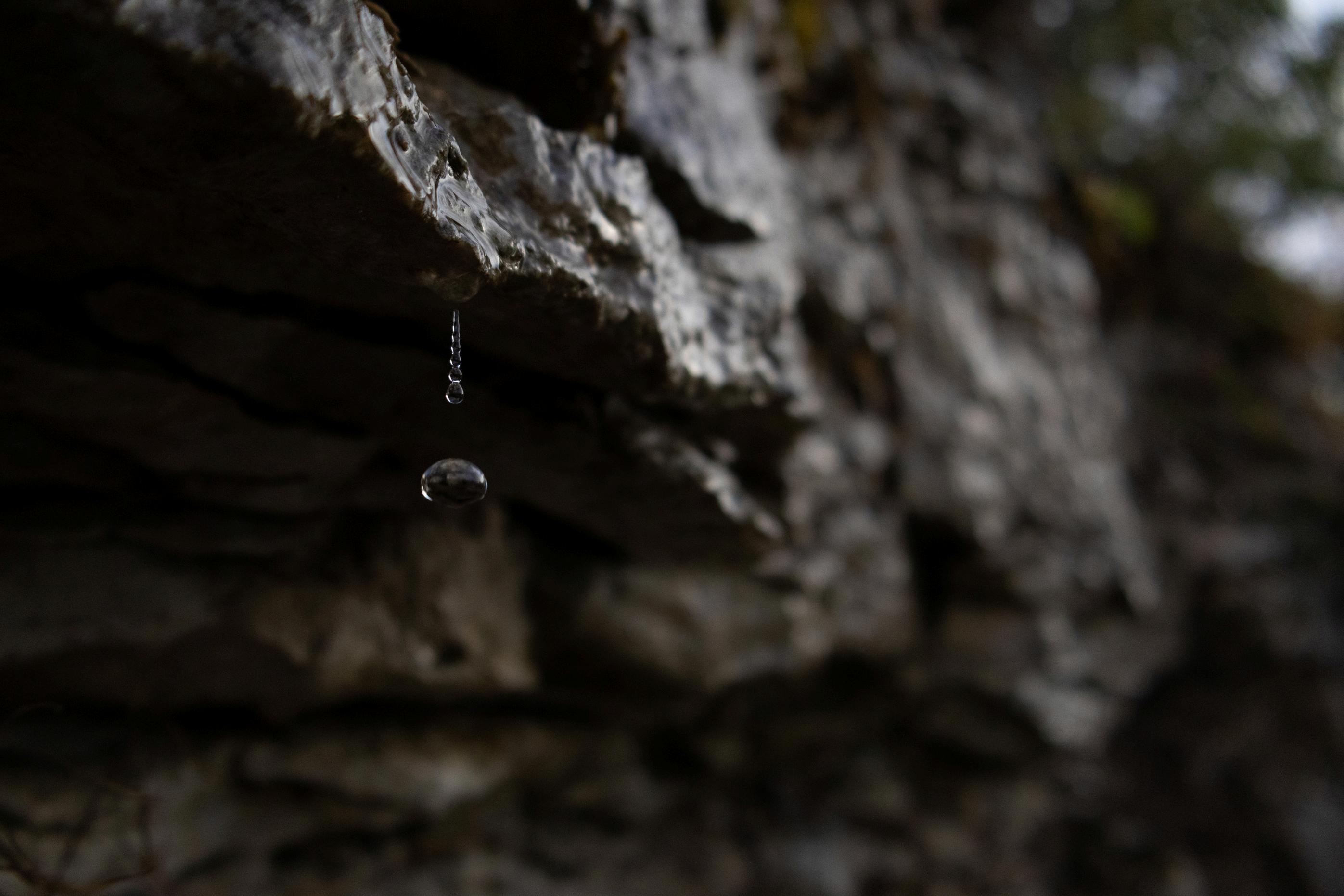
3 Table of Contents
Britta Elsbernd Reflections of a Camp Counselor
We go to camp to get outside: to breathe fresh air, step off the beaten trail, get a little dirty. We go to camp to drop the burden of being clean: to trade polished hardwood floors for hastily swept wood floors, to forget about closing doors, (to forget about doors entirely), to be less civilized, but more human.
We go to camp to get outside, an open expanse where personalities can expand, and whispers of laughter can swell into song. Unmoored from expectations, we drift, grow, change, become. We watch, as the tide carries us from the shore, and the selves we left on land shrink away.
We go to camp to get outside, to escape the outline of the ordinary and cover new ground. Outside, there is space to adventure in the unknown, and stretch far past our comfort zone, getting lost in trees and new memories.
And when we are outside, we find that the sun shines brighter, Smiles stretch wider, (Spiders aren’t as scary as we thought). We realize that the things that confine us are the things that bind us, and with dirty feet and unbrushed hair, we find ways to be free to become free from the things that used to define us.
And all too soon, we’re moving indoors again: Packing swimsuits away into suitcases, rain boots into grocery bags, somehow fitting our spirited souls into buildings, and our open hearts into walls.
The last sun sets, and we go back inside, but we don’t stay inside anymore, because we now know that the world exists, life exists, we exist, beyond bound.
4 Table of Contents
Sorley Swanstrom-Arnold Creating a Home
Lay down your bedroll
Let these ancient waters wash you clean
Let them grow your roots deep and old
Care for those here
Love those to come
Let go the fear of later years
Suffer not the urge to run on
Let your feet remain firm
And strengthen the ground your friends stand upon
To remain is not death
For those who have been, and those to be
To stay is to give breath
5 Table of Contents
Temporary Goose
After Basho
I. As the clouds drift apart
For now friend we separate
Wild geese living leave.
II. My brother must soon—
Ethan Kober
He takes flight amongst the heavens Tests his mettle against gale and professions. The nest no longer confines, But it no longer protects.
III. We are not brothers.
Wrought under the same sky
Grey duck and goose
Away from the nest we Flew into deep sky.
IV. Buffeted and battered by winds
Neither knowing where or if to turn
Then—
Wild, yet found The eye of the storm brings us together And tears us apart.
V. I’ve never done this without him, without them
Standing on starting lines
We are off together Finish together
Laugh together
Be together.
He starts on a journey I can only watch: Listening to wingbeats
Thunder
Echo— Gone.
VI. No storm can yet blot out
No rain can yet smudge away
No lightning can yet petrify
Living Lasting
Love.
VII. All temporary Divine are drifting clouds
And the time spent beneath.
Written in Spring, 1672 The Japanese word kari can mean both “temporary” or “wild goose ” Matsuo, Bashō Bashō: The Complete Haiku of Matsuo Bashō. Translated by Andrew Fitzsimons. Oakland, California, University of California Press. 2022.
1 1
6 Table of Contents
Phelps Park Bridge
Michael Burns
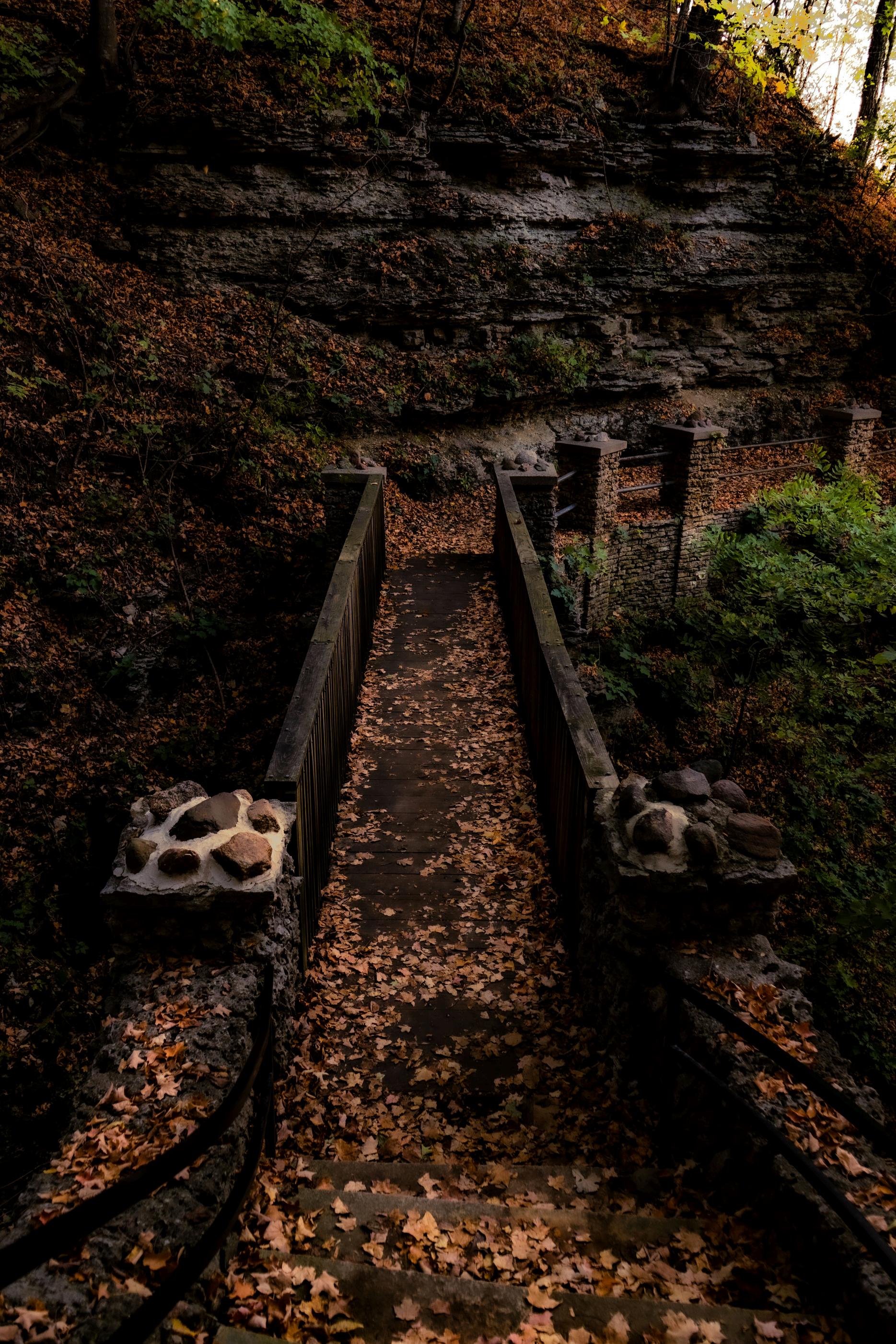
Bauer Bodoni
7 Table of Contents
Eleanor Van Fleet Dorothy
Dorothy is a lovely lady. Before coming into her house, I was requested to pick up the mail and put the toilet seat on her back porch into her garbage can. I had never met her before, so this blind trust interested me. I had appreciated it, and still wonder where it came from.
After putting the wobbly toilet seat in the brown trash bin – as instructed – I trudge up the stairs with my extra shoes, headphones, plenty of rags, and an impressive stack of magazines. I knock and take in the landscape. It’s barren, as the midwest tends to be in late November, and the clouds cover the sunset like stuffy drapes, making the grass even more colorless. Forgotten buildings are strewn across the property, and the treeless yard is surrounded by plowed fields. With little to hold it back, the wind runs its cold fingers across my neck. Peeking over my shoulder, I decide to go ahead and let myself in.
Dorothy is sitting at a folding table about five feet from the door. We make eye contact and she screams, then falls into a fit of laughter, which I happily join in on. She invites me to sit down and immediately offers me all the lovely items that only older ladies seem to have access to: bunnythemed postage stamps, free samples of wrapping paper, wall calendars, and a copy of The Old Farmer’s Almanac (score!). She asks me all about myself and quickly learns my major, my plans after graduation, where I’m from, and my cat’s name. And, once she decides she’s figured out enough about me, she tells me where the vacuum is and goes back to sorting her mail.
While vacuuming countless dead box-elder bugs, I notice the grooves in the carpet from Dorothy’s walker. The well-worn paths throughout the house tell me a little more about her, like where she likes to sit on the couch and how infrequently she goes into the spaces that I assume fall under her husband’s reign. When I’m done, she has me help her make her bed. While on either side of the mattress, making sure the blanket is even, she tells me about him. I knew that she recently put him in a nursing home, but didn’t realize how recent. The previous week, he fell in the bathroom and passed out against the door, so Dorothy had to wait for him to wake up before somehow managing to get him to the hospital. She tells the story as if it’s what she had for breakfast, and then
8 Table of Contents
takes me to her husband’s office. Apparently she wasn’t allowed inside when he was around, and her eyes lit up with the idea of being able to clean it out. She looks around at the piles of boxes and dust covered tools, and decides the most effective thing to do is have me vacuum the spider webs off the ceiling.
My arms scream the entire time, but I don’t take a break. It felt necessary to show how strong I was, even though no one was in the room with me. My hope was that the presence of a strong woman would banish the remnants of misogyny that undoubtedly lingered. When I’m finally done, I follow the tracks back to the dining room, where Dorothy is typing something into a calculator. She has me scrub her cabinets, which is lovely because we’re able to chat while I do so. She tells me about her grandkids and her friends, who she seems to have more time to spend with now. While she’s talking I pay attention to her mannerisms. Her eyes light up with energy, her skin is glowing, and hope infects her voice. I’ve seen this all too many times. The husband leaves, dies, goes on a trip – and the mother, grandmother, or sister is free. Usually these feelings are hidden, but Dorothy doesn’t bother. Instead, she tells me how she can stay up to read as late as she wants, now that he’s gone.
My next task is not really in my job description, but I don’t mind. She asks me if I know how to set a mousetrap, and when I say no she teaches me how. She encourages me while I tentatively pull back the thin metal and latch it under the clasp. Then, slowly as possible, I bend down to slide it under the fridge. Just as I set it on the floor, it snaps and I let out a little screech. She asks me to try again, which I very much do not want to do, but try anyway. During my second attempt, she tells me that one of the reasons she kept her husband around was so that he could set mouse traps for her. She’s interrupted by another snap and screech. “It’s okay, honey,” she says, “ you don’t have to.” But now I’m determined. I will set this god damn mouse trap, and I’ll do it better than her husband ever could. The third and fourth tries are unsuccessful, but I manage not to jump or scream as much. On my fifth try, I set down the mouse trap with feather-like grace, and it stays put. I stare it down for a good five seconds, and then smile up at her. My two hours are up, so I gather my belongings and gifts and say goodbye to Dorothy. Just as I turn to leave, a loud snap comes from the kitchen. I set down my bag and start to take off my shoes, but she stops me. “Don’t worry about it,” she smiles, “I’ll manage.”
9
Sea Orme Pinocchio Gets Dressed
1.
Wake up. Are you actually awake? Blink and stare at the ceiling; wonder what time you fell asleep last night. Count the dampening cracks that hint towards a possible mold outbreak. There’s an especially large patch in the corner. Nod your head at it. It’s important to be polite.
2.
Tell yourself you’ll start going to bed earlier. Watch your nose grow.
3. Try on a shirt and watch it become a second skin; tuck it in, pull it out, tear it off, trade it for another one. Try on seven more shirts. Watch your nose grow.
Drag yourself out of your blanket nest; trip over an invisible dog; brush your teeth; spit in the sink; lean towards the mirror. Flay yourself with your eyes. Cross your arms over your breasts. Wish you were anything else.
4. Opt for a sweatshirt.
5. Drift through your classes. Nod. Smile. Are you actually awake?
6. Call Geppetto. Feel fire curl in your ribs and up your throat. Bare your teeth. Do not throw up. Do not cry. Do not feel homesick. Watch your nose grow.
7. Ignore your history; ignore your roots; there are thumbtacks sunken deep into the creases of your jaw and tendons; there are wires wrapped silver around your wrists. Your skin is soft and smells like rain, like moss, like bark, so wear perfume. Pretend you cannot hear the trees. They murmur sonnets. You think you are not a poetry person. Watch your nose grow.
9.
8. You think you are not a person at all.
Drink in the presence of your friends like air. Gratefulness is not an emotion; gratefulness is a state of being. Sink into it. Survive.
Lose yourself in music. Recognize the dangers of walking late at night. Bring mace and keep your phone easily accessible. It is one in the morning. Feel the fire fade; feel your soul expand into the thrum of rhythm and harmony and nature. Sing. Cry.
Take off your headphones. Place your palm against the trunk of a tree, fingers splayed like a frog’s gymnast body. Press your fingers into the dampness of wood, spongy with dew and snail slime, slick with moss. Let the edges of darkness slink into your vision. Look at the stars; bathe in their gentle, humming light. Watch your nose.
10.
11.
12. Breathe. 13. Wake up. 14.
10 Table of Contents
In the Real Early Morning
Marina Beachy
Title credit: “In The Real Early Morning” by Jacob Collier (2016)
In the real early morning
I shake from the stillness
The cool dawn has to offer.
Half crow of the rooster, Nocturnal eyes of the cat, Blinking; both heavy with sleep. Even
The guardian of the veil and The early bird’s greeter Must awaken, too.
The knot loosens
To be secured tighter when my grandparents begin the hour in rooms separate, things separate; oatmeal and devotions each in the quiet, sacred rooms of their shared house.
My mother cans tomatoes On the phone with her mother when she can’t sleep. Isn’t it funny how
of our restaurant.
The first of the bunch arrive and sit in the gentle comfort of the shared space
(reading the newspaper I set out on the table and the coffee I prepared for them) of our restaurant
I hear without understanding the voices of the 80s channel show hosts from my boss's favorite radio station
As they whirr inaudibly in the background of our morning, encouraging us to keep going,
And eventually, I realize that no one is truly alone. cigarette, bacon devotion, oatmeal newspaper, coffee;
along with the quiet murmur of the radio voices my humming heart beats awake.
In a time zone difference of eight hours, two people can align perfectly?
When I am fighting the real early morning
My boss embraces me into the shared space (that smells of his cigarettes and the bacon grease of the sandwich he’s prepared for me)
11 Table of Contents
Jante Grace McIlrath
Du skal ikke tro at du er noe.
– Aksel Sandemose, “En Flyktning Krysser Sitt Spor”
Cool water ran around large stones and over a pallid hand draped over the bank. Trees jutted upwards reaching for the cloudy sky. The caw of a crow broke through the stillness; its body a dark speck circling above. A thin dog weaved its way through the bramble. It pushed the hand with its nose then barked softly.
“Beruska?” A voice called from deeper in the woods. “Beruska?”
The dog whined. An elderly man stepped into the clearing; he had a long, gaunt face, soft grey hair, and a carefully trimmed beard that stretched just beyond the collarbone. He carried a bundle of freshly collected herbs tied together by twine. The dog, Beruska, ran up to him and pushed her head against his leg. He rubbed it gently as he observed the area for what was causing such a stir.
His hand stilled.
By the stream was a boy no older than sixteen, pallid and still. His clothes were tattered and his feet bare, blank eyes stared up at the heavens. The old man bent down next to him and pressed two fingers against his throat. His skin was waxy and cold. A heavy sigh came from deep in the old man’s chest; the boy had far too many years ahead of him that he wouldn’t spend. Reaching underneath the boy, the old man lifted the stiff body bridal style. Long strands of dark, auburn hair spilled over his arm.
Back at his small house just outside of the forest’s edge, the man lowered the boy to the ground and grabbed a shovel from his shed. He dug as much as his aching joints would allow him then took a break for supper. The smell of hot butter and fresh thyme filled his kitchen. He hummed to himself as he added the fish and sliced potato to the skillet. They protested in angry crackles, and threw hot spurts of butter at the old man. Patiently, he waited for them to simmer down. He squeezed a lemon over the fish and spooned the herb butter over everything, turning their exterior a beautiful brown before scooping them into a bowl. Juices dribbled out as he cut into his first bite. It was acceptable – the potatoes were soft with a nice crispiness around the peel, the fish melted in his mouth, and the thyme beautifully cut the tang of the lemon. From the kitchen window, he could see the grave he had been in the process of digging. The hole, he deemed while washing the dishes, would be a sufficient burial plot for the stranger. He searched his closet for something more appropriate for the boy to be buried in. It seemed unnecessarily cruel to bury him in his tattered jeans and sweater. The old man was as tall as the boy, but not quite as lean. Unable to find anything, he broke into his old cedar chest. He took out one of his suits he hadn’t worn since he was a young man. Probably not what the boy would want to be buried in, but at least it would fit somewhat properly. The old quilt buried under the suit caught his eye, and he grabbed it as well.
12 Table of Contents
The man took them outside to the boy. It was harder than it looked to dress a body. Beads of sweat ran down his temples and a dull ache gripped his muscles. He sat down on the edge of the grave before sliding in. The hole had been dug just wide enough to allow for the both of them. Carefully, he scooped the quilt wrapped boy into his arms and lowered him in using the edge of the grave to prevent him from falling ungracefully. Beruska looked down at him from above; her expression eerily echoing that of human grief. He stroked the back of her head with a dirt coated hand. The man went inside for a quick bath and change of clothes. He wanted to give the unfortunate boy a respectable funeral. It was the least he could do.
Clear water turned murky as the man scrubbed vigorously at his skin thinking about what unfortunate fate could have befallen the boy. He was so young; pimples still scattered his forehead. Death was not supposed to meet the youth, only observe. He pulled the plug and the water gurgled as it swirled around the drain. The boy’s poor mother never to have her child walk through the door again. The old man sighed, a string of impolite words laced in underneath. He looked at his own wrinkled face in the grimey mirror reaching up and stretching it to have the appearance of smoothness.
A single flame flickered against the autumnal dark. The old man fingered through a worn copy of the Bible. Not having enough light to actually read it, he tossed it aside. There weren’t words to encapsulate the tragedy anyways. He picked up a handful of dirt and tossed it down, mumbling an apology to the dark void. He took another handful and repeated the gesture for Beruska. She nuzzled his leg with her head. They stood in silence for a moment. An owl called out from the forest filling the air with an echoing question. The man took a deep breath and grabbed the shovel.
Satisfied, the old man leaned back in his old leather chair and kicked his feet up onto the stool near the fireplace. The heat of the fire leaked uncomfortably into the giant hole that his big toe stuck out of; he pulled up the sock as much as he could to cover it. Beruska sat across from him on a small ottoman watching him intently. She leaned in; her paws hung off the edge as if she were waiting for something. The old man pulled out a tin of snus and placed a packet in his lip before settling deeper into the old recliner. Fire and disappointment flickered in the reflection of her eyes. She let out a low whine. Why don’t you do more, he could hear her saying.
The old man sighed, and told her, “What else is there to be done?”
He was just an old man in the woods. He wasn’t a detective able to find answers. He wasn’t a priest able to grant respite. He wasn’t anything. There was nothing more he could do, nor should he be expected to. The boy had his suit, had his burial. He’d lift his head high as he walked through the Gates of Heaven. There was nothing left for the old man to do.
13
Michael Burns Late Night Decorah
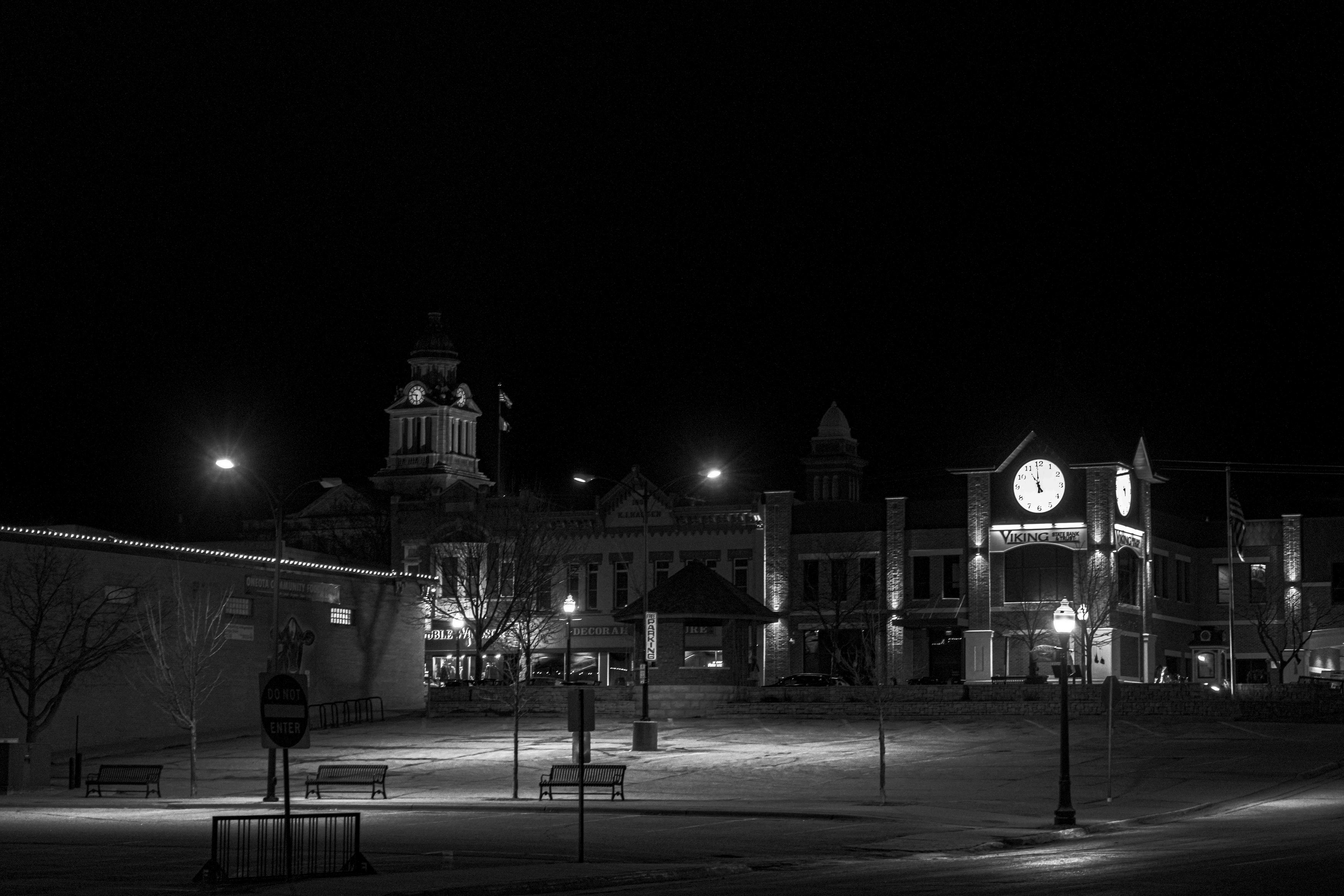
14 Table of Contents
L'Engle Charis-Carlson Seated Studies



15 Table of Contents
Joey Maiden Window Boy
To the boy in my window
The one who hides
The one who only comes out at night
Are you a ghost?
A figment of my imagination?
Mom says I have a wild imagination I see you through my mirror
But I turn around and you're not there anymore
You watch me
But only when you think I don't see you
You come around all the time but never say hi
I tell my parents but when I do they never see you
Now when I leave you follow
School, work, and back to my bedroom window
I call the police and they said just keep an eye on you
So I did
I listed every time I saw him
But no one seemed care I kept on going
He kept on watching
No one seemed to think it was a big deal
It's just a peeping tom”
“Tell him to get lost”
“Close your window shade”
But I do close the shades
I close them but by morning they are open again
I tried to catch him in the act
485 times to be exact
But I always failed to catch him on camera
Yet he caught me on his camera
Enough times that he could fill a wall
A wall of that last year
Before it all went down
Before I went on my morning jog
If a tree falls and no one hears it, does it really make a sound?
If a girl gets killed but the body was never found
Is she really dead?
If a murderer is never caught does it still matter?
It took them fifteen years to pull my body out of that lake
Fifteen years of being nothing more than a speculated runaway
I reported him the police
I did what I was supposed to
But I'm dead
And he was never found
16 Table of Contents
Fog over the Pasture
Grace McIlrath

17 Table of Contents
Mattie Snyder Questions
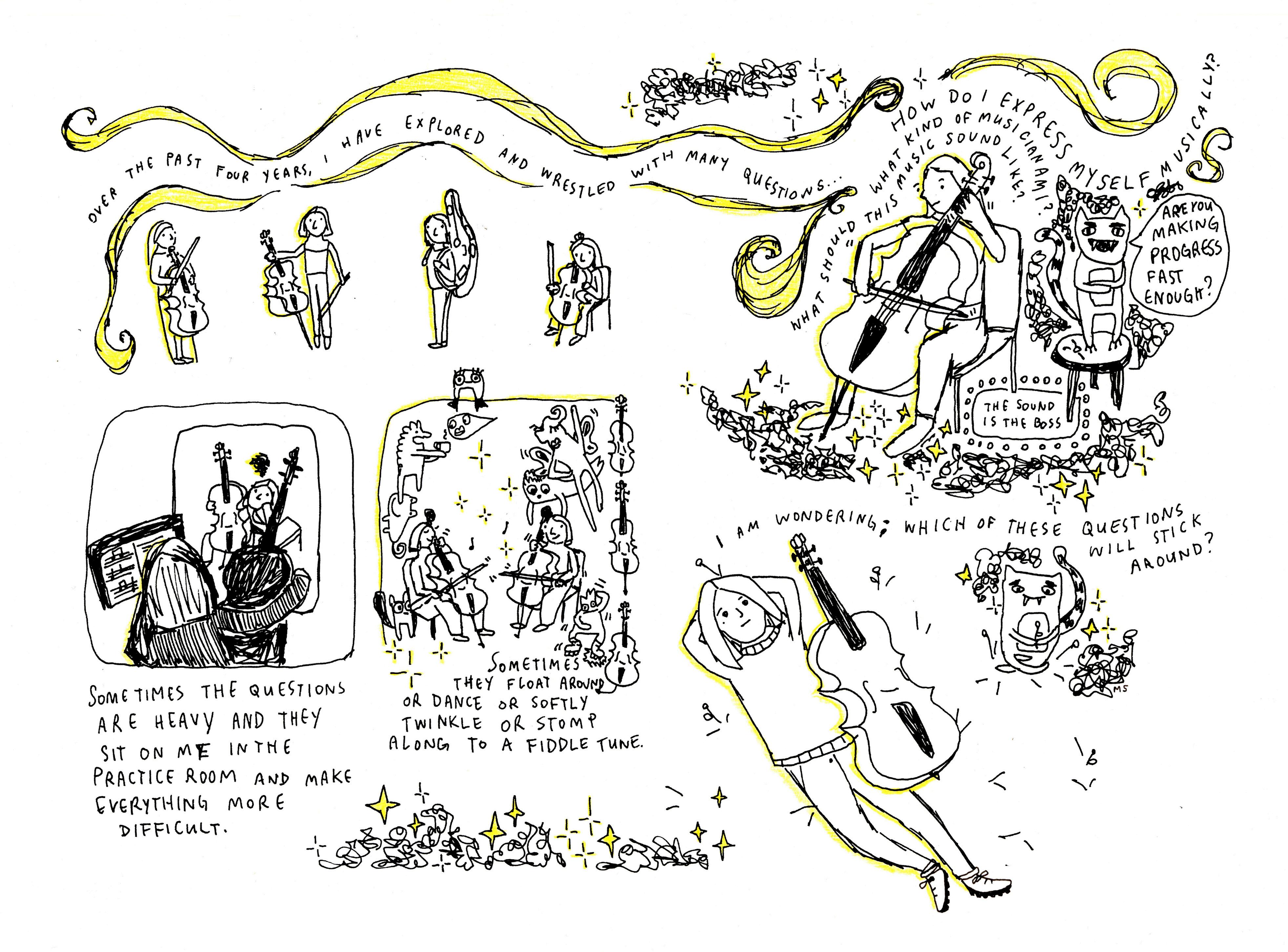
18 Table of Contents
Self Portrait in a Mirror
L'Engle Charis-Carlson

19 Table of Contents
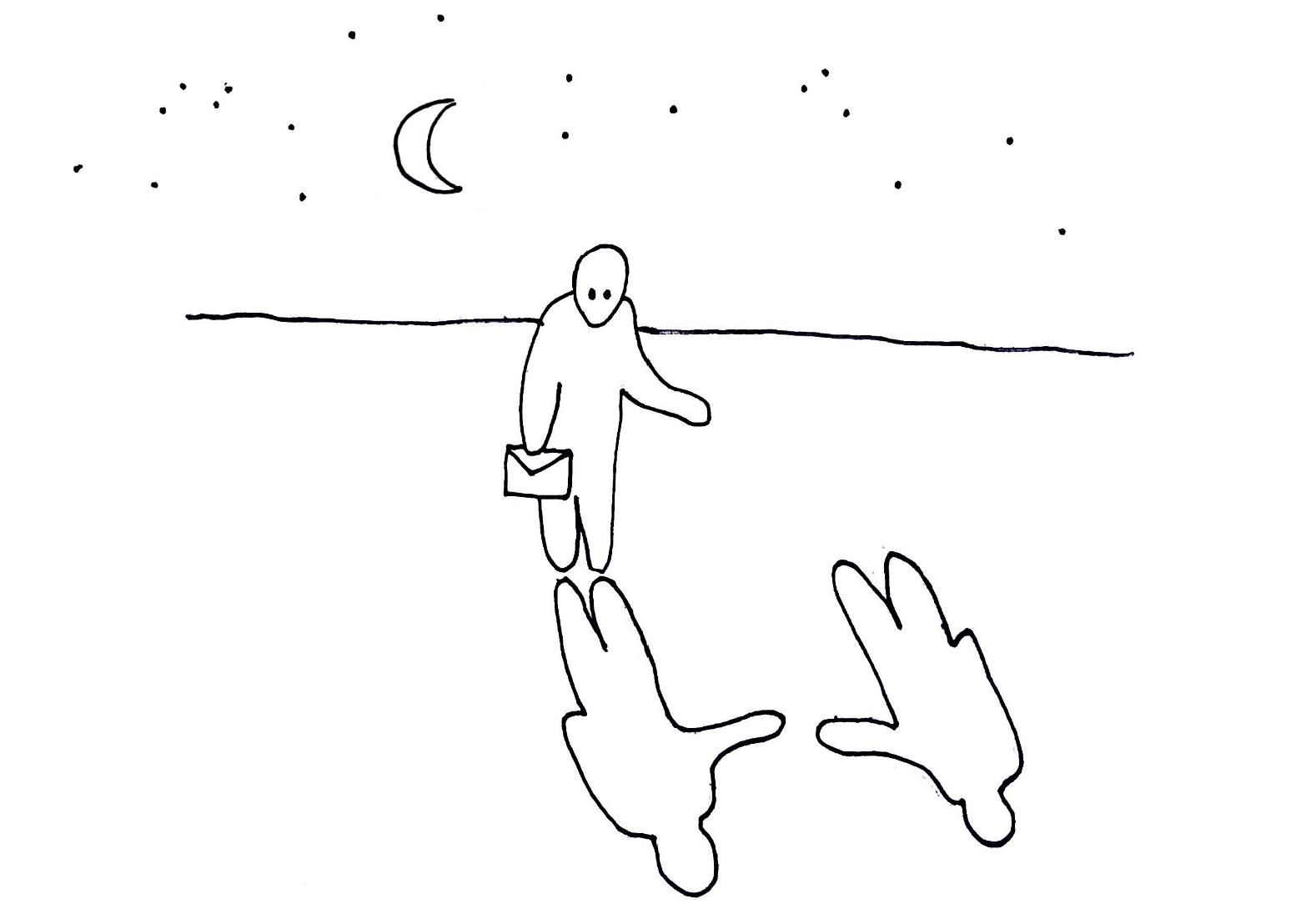
Imdieke If You Were Here... 20 Table of Contents
Ashley
In Which the Prince was a Constellation
Sea Orme
And the moon hung in the sky a giant glistening orb of silk a closed, thrumming lid of an eye webbed with veins scarred with craters it watched
Den lille havfrue looking up: she wished for legs and eternal soul that she might kiss everywhere the light brushed.
21 Table of Contents
William Ode Full Tomato
There is full tomato Hunkered in the dirt
A portly red-green fellow Auspiciously inert
Bending down the tall green stalk
A crane with too much freight
Nestled in the soil He sits patiently and waits
Hiding in a heap of leaves
A smile on his face
As if I were to pick him From his resting place He’d launch the pile Trebuchet-style Into outer space
22 Table of Contents
Elijah Lehmann Astronomical Love
For Jeffery Wilkerson and Kate Narveson
Viewing the stars, I find myself amazed
With what lies in such unreachable distance.
The magnitude of space has left me dazed, I chase the facts with vigorous persistence.
And yet the brightness of this intense passion Pales when compared to her shine over me. For what I’ve learned is but outdated fashion And her eyes more than sun, will my soul free.
I have begun to measure doppler shifts, Daring in direction to measure out my chance. Faint blue eyes as evidence that lifts My heart to trace her perfect astral dance.
Yet vain dust, her image did cloud my eyes And I fear I’ve embraced precisional lies.
23 Table of Contents
In the Company of a Rose
A rose droops across my desk, its head nodding off, gaze falling downward.
I remember when it was young once, barely a bud on the bush, when it first looked out into the world –just looking to see what it could see.
Ashley Imdieke
So I brought it back outside, back to the bush of course.
After many days of watching it grow and look around, I thought to myself: perhaps I’ll bring it inside with me so that we might at least keep each other company.
So after we watched the days go by together, me in my chair, the rose in its jar on the desk, I saw how tired it looked.
I saw how it longed to lay down and to rest its eyes.
And I watched it meet the earth, and grow peacefully into the soil upon which that bush grew. Here comes summer, fall, winter… Until one spring day I was sitting at my desk, and glanced out at that bush, only to see a young one –barely a bud –that I swear was looking back at me like it knew me.
And after many days of watching it grow and look around, I thought to myself: perhaps I’ll bring it inside with me so that we might at least keep each other company.
24 Table of Contents
Joey Maiden
I swore up and down I’d never be that girl
My mom made me promise her I wouldn’t I wouldn’t be the girl taken advantage of by the world
The girl who thinks it’s love
The girl so blinded by the beauty of growing flowers
That she misses the snake lying just below them
Something you learn well gardening is that if you pull a weed
You must throw it far away from where it was pulled
If you just leave it where was
Or move it to another area of the garden it will grow back
Weeds are pesky like that
They are hard to get rid of
I desperately tried to keep our garden growing
Well I was pulling weeds and watering flowers
You stood by throwing the pulled weeds back into our garden
It turns out I was wrong it wasn’t our garden it was mine
It was my garden
My garden that we both convinced ourselves was ours
I was so blinded by the flowers I didn’t see the snake
I was so focused on pulling weeds
I didn’t see you throwing them back at me
I was that girl
The girl who was dumbstruck in love
I let you use me
I let you tear me down
I saw the red flags and I turned them into Roses, Carnations and Amaryllis
I thought they added complexity to our garden
Turns out all they brought me was pain
I defended you to all my friends
When my mom told me I was better than this
I scoffed
I thought everyone was being over dramatic
Because I loved you and you loved me
And isn’t that what matters
But the reality was I loved you and you loved yourself
You don’t know how to love
I won’t sit here and say I’m not fucked up
I am
But at least I tended the wounds I caused you
I couldn’t bare to be the reason you got a scar
But you seemed to not mind opening the same wounds
As soon as they started to heal
And yet I apologized for you
I promised I wouldn’t be that girl
I promised I would be better
Better than
My Mother
My Grandma
My Aunt
Yet here I am still healing from the snake bite
The snake bite I got because I was to blinded by the promise of
A growing, loving and never ending garden
25 Table of Contents
The Garden
Why is it called a period if mine has no end?
I don’t want to bleed with the moon, I don’t see that as my sacred, destined prerogative. There’s an invisible hatchet, pulsating in my abdomen.
Anna Stenerson
Pangs run down my legs and deep into the soil of Mother Earth–yet I don’t envy the way she bleeds.
My longest kept secret was my period.
On top of sitting in little pools of blood I nearly drowned in a sea of shame. I’ve had this case of the empties ever since finding light pink pee on torn toilet paper one morning. “Pretty pee!”
No, that’s not right.
I scream on the toilet for mom.
I’m met immediately with love and her safe, nurturing self.
I see instant nostalgia flash through her eyes for my childhood and empathy in her furrowed eyebrows. I feel her disdain for what was to come, we had no idea.
This May marks a decade of blood.
Ten years of ferocious bleeding has made me question the things we say to young people when they first start their periods.
Now you’re older!
What if I don’t want to grow up right now?
Now you’re a real woman.
What if I don’t want to be a fully ‘real’ woman?
Now you’re able to have children!
What if I don't want children? What if I can’t have them anyways?
When my end comes, may I rest in the soil and accompany the earth in her bleeding, until she cannot bleed anymore.
26 Table of Contents
Mia Irving Eggs
We are born with it
No more, No less, Than one million Tiny pearls we are forced to spend.
I wish I could give them away As gifts.
Like how a cat brings in a bloody bird or A mangled mouse. I’d give One to Glee
Three to public libraries and An ocean of cracked eggshells to you.
Free the Golden radial spikes Of confetti
That pierce my heart, My abdomen, My brain.
Tear open the Crimson, stringy, elastic chunks of My flesh
Wrapped in filmy plastic That rips in the bathroom stall.
And I will, happily, Wait for you to fall And not attach.
Because of all the places I bleed from, You scare me the least.
Except when the gnawing ache Of wanting it to be over Lasts longer than five days.
27 Table of Contents
The Golden Glow
Ava Shively
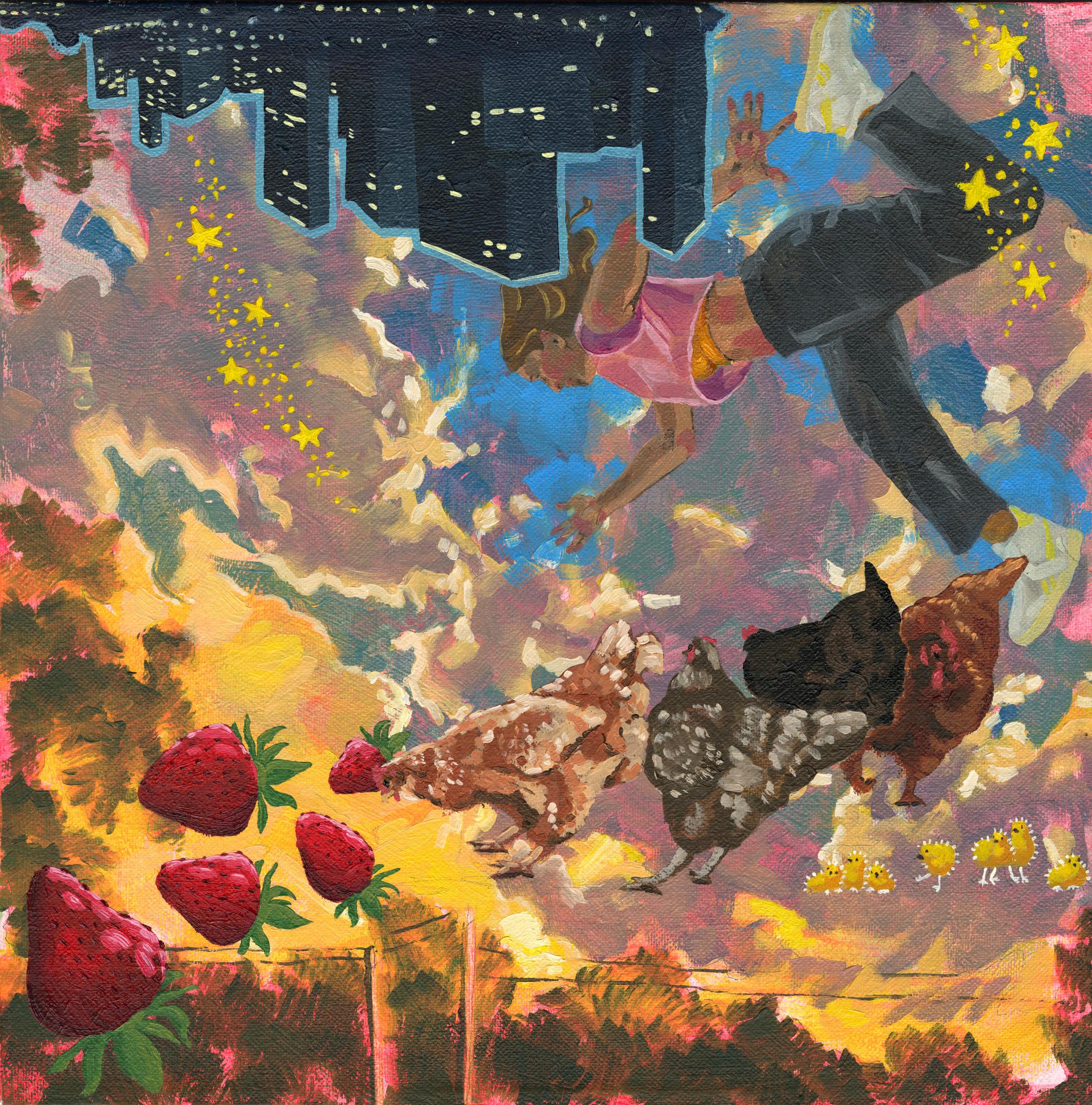
28 Table of Contents
Woman I am
Maggie Bruck
woman I am. sometimes a poet, always a poem touched by those who look I am permanently temporary on the lips reaching far and wide hear the words, beg to hear the words to most, valuable only if small and easy to understand
I am not small or easy to understand but woman I am. always a poem not so coarse to read if you listen.
29 Table of Contents
Pleasant Night Out
Ava Shively

30 Table of Contents
The (Sound) Waves of the Weekend
The bar counter is coated in elbows, As people auction for the next round. Faint sounds of freedom spread.
The liquor has turned to laughing; Harmonious sounds offering distraction, The tuning of the night has begun.
Ears are bombarded with soundwaves, Symphonies of stories fill the room; Voices creating musical masterpieces.
There’s the beat of the heart filled base, Which adds to the fortissimo building, Shouts conduct the stumbling song.
In collective agreement there is no Tomorrow, the rhythmic night is nothing To mess with, to ruin for one’s gain.
Yet the waves of sound begin to crash the music falters, becoming choppy, Sobriety enters, baseless bidding stops.
Elijah Lehmann
The lights flash in warning, the night Is slowly sinking, low, like sorrowful tides. Reality reveals itself amongst the ebb.
We’re caught in the limited littoral. Begging for the calming chaotic wave, Eager to find it, upon the drunken sea.
Tomorrow a torture of silent affairs, Adopting the actions we’d think to not Be our own, music incited us to do.
Voyagers, plunderers, we unwillingly Become, we’re desperate for the masses To hide our failures and deep sea fears.
The bar’s like a boat, barely holding us Afloat, it’s no secret why we keep coming Back, waves of nothing sound so lively
We’ve tried for meaning, searched for love, The depths of silence had us breathless. It’s comfortable compromise in shallow waves.
31 Table of Contents
Margaret Mullin Accompaniment
Meant to accompany. Akin to the musical following, bending, adapting to pauses and wavers, but more like weaving through the grocery store aisle with you, leaning back off the front of the cart, fingers pink wrapped around the intertwined metal, trundling along, wind in my hair feels like riding in the car with the windows down, brisk, but I reach out regardless to drop the letter off at the post box, with you, another cycle of deliverance, feels like walking the dog, trotting a few steps ahead, the smack of bare feet on pavement, pulled by the need to lead in proximity, like the need to choose the song delicately to meld with the senses that encircle us for the 6-minute drive to pick a friend up from work. A one-person task.
Two is a company. We swing by the back entrance, and now three is a celebration!
Of the time I sat on the edge of your wooden dresser nodding, picking at my knee, listening, as a body in a space of not need, but yearn, because we all ache for company, and I would go anywhere with you.
And I do.
32 Table of Contents
Now, to pick out the color to coat the kitchen walls and to fleck your freckled legs and mine lean on the front stoop, hairy, extending down a step, wiggling toes speckled with dirt that you toss, and the crab grass mound grows. Scratching at my knee, I watch, in accompaniment. How else can I show you the warmth of your summer rain smell when you come inside after a run, your rhythmic footfalls up the creaky old stairs, and the veins in our hands meeting when we grasp at anything amidst the swirl of constant leavers, constant ends.
How else can I show you what it feels like when you drive away. I stare out over the window box that we just soaked with the hose, together, blooms dewy like my cheeks. Don’t leave again. Let me come too.
In accompaniment.
33
Eleanor Van Fleet Anne & Sylvia
Two women who changed the world, or at least my world, with their confessional poetry. Two women, incredibly different yet strikingly similar in their experiences: Anne Sexton, the chain-smoking model-turned poet, and Sylvia Plath, the overachiever with an IQ of 166. Two women struggling with mental illness, abusive relationships, motherhood, and their desire to stay alive. I see these issues existing around every corner. In the news, in the books I read, when I catch up with my friends, in the mirror. Women are linked by this unfortunate chain that stretches through lifetimes, but at least we’re connected.
…
Anne and Sylvia were peers. Maybe friends, maybe competitors, but definitely peers. Born within five years of each other, they grew up in the same suburb, but somehow didn’t meet until they were well into adulthood. Sometimes, for fun, I like to imagine what their first encounter might have been like. Were they intrigued by each other? Intimidated? Contemplative? I choose to believe that they held a level of respect for one another. The same level of respect my brain reserves for the women I meet, one laced with belonging.
It is difficult to live in a dangerous and invulnerable world. The danger is pervasive. It manages to reach all of us, but it has a specifically cruel and perverted eye for women. Growing up as a woman means always checking your back in case you’re followed. It means making sure you’re never alone in a room full of men. It means covering your friend’s drink while she goes to the bathroom. It means listening to story after story of sexual assault, rape, harassment; until you finally come to the conclusion that every woman has her own story.
So how can we not respect each other? How can we look at each other and not recognize the one burden we know we all share? Anne and Sylvia share this burden through poetry with no boundaries. They share it all. They understand the danger of isolation, and challenge it by laying their experiences out for the world to see. I refuse to believe that they weren’t intrigued or impressed by the other when they crossed paths.
…
They met in a poetry workshop at Boston University in 1959. Anne started the workshop as a fairly new writer, struggling with early motherhood and mental illnesses. She had been staying in a psychiatric hospital after having attempted suicide on her birthday. In order to help her recover, her doctor urged her to begin writing poetry again. She named her first published poem after him: “You, Doctor Martin,” followed by seven successful books of poetry.
34 Table of Contents
Sylvia entered the workshop just after Anne. At the time she was married to Ted Hughes, and they had not yet had their two children. Sylvia had been teaching for a year, and was strained by the demands of the position. Because of this, she had a brief falling out with her usual creativity in writing, prompting her to slip into the back of the workshop and observe.
Throughout my research on the two poets, I often find references to the workshop they met at. It had an intense atmosphere, filled with about 20 talented poets who had to compete for their spot. The workshop created an opening for Anne Sexton and Sylvia Plath to cross paths, something I will be eternally grateful for. Being in an environment immersed by poetry connected the two women, weaving together a supportive web of encouragement.
In her essay “The barfly ought to sing,” Anne Sexton describes her relationship with Sylvia outside the poetry workshop. Afterwards, the two of them would go to a fancy hotel and drink martinis and chat about their lives. This is where Anne & Silvia shared their intrigue in death, describing their suicide attempts in detail to each other: “We talked death with burned-up intensity, both of us drawn to it like moths to an electric light bulb.”
…
Perhaps unsurprisingly, Anne and Sylvia were heavily criticized for their poetry, mostly by men, because it was “too confessional.” At the time it was uncommon for women to share their experiences, particularly the more intimate topics of suicide, abusive relationships, and the difficulties of motherhood. But many readers found comfort and strength in the poets’ words, discovering validation that had been deprived by the fear of being different.
Sharing brings empowerment, and the fear of sharing closes chances at strengthening a community. I experienced this last week, when my best friend and I decided to indulge in the $1 margarita special at Applebee’s. It was a rainy night, and the restaurant was packed. We sat at a table off to the side, next to the window. We could watch the rain peacefully while finding comfort in the noise that surrounded us. I have known this friend for years, and she has been the sort to keep parts of her life to herself- a firm believer in the TMI rule, which I am not. After repeatedly warning me that “this might be gross” or “I hope this doesn’t make you uncomfortable,” to which I reassured her it most certainly would not- she informed me that her boyfriend had been getting increasingly angry with her when she refused to have sex with him. Recently, it had gotten to the point where he had raised his voice at her. I asked her how long it had been happening,
35
and she told me that he had been like this since the start of their relationship. They had been together for four years.
Is this why women have been so heavily shamed for revealing their true experiences? Is it some sick way to keep us apart, to not allow us to tell our friends to break up with their shit boyfriends? What do we lose when we are torn apart?
I think that the reason women tend to keep their stories to themselves comes from shame. Women have been shamed for every little thing throughout history. Being too skinny or too fat or too tall, having body hair, not smiling enough, getting our periods, not sitting “ladylike,” growing old, being too career focused or too boring, dressing comfortably, wearing too much or not enough makeup, the list can go on and on. And these are just the surface level shames. The standards have changed throughout history, but remain as harsh. For example, it was okay for women to have body hair back when it wasn’t okay for them to show their underarms or legs. As soon as they stopped being shamed for that, they started being shamed for their body hair. You really can’t win, and not many women want to.
Now we need to get into the more dangerous things women are shamed for. Like when you finally muster up the courage to get help and are asked the questions “what were you wearing?” or “why didn’t you stop him?” or “why were you in that situation anyway?” Women are given a constant underlying responsibility for every situation they are in. Everything wrong that happens to us can and will be tracked to something we did to deserve it. This is why when women share stories they have a list of explanations ready, just in case someone asks them why they “got themselves” into the situation. This is why we don’t share often, and why we feel like we need to keep our lives private, even from our loved ones. …
As I am sitting across from my friend in Applebee’s, I wonder how Sylvia or Anne would respond to her situation. Would they, as women from the 1950’s, be as astounded as I was? Would they, like me, believe that one of the biggest issues of her situation was that she was too self-conscious to share with me, her best friend, that this had been happening for four years? What do we lose when we’re torn apart? We lose companionship, guidance, and self worth. We lose something invaluable: solidarity.
…
36
Slouching Towards Bethlehem
After William Butler Yeats
Amen, I say Amen
Gather the brothers and sisters of Christ
We are slouching towards Bethlehem
Amen my child, Amen
Sing with the chorus, and bow with the hymn
We are crawling towards Bethlehem
All you women, all you men
Feed from the lichen, the leaves, and the roots
We are hiking towards Bethlehem
Listen here, children. Listen in!
Choke down the body and inhale the wine!
We are racing towards Bethlehem
Children, get in line again.
Take out your passports and empty your bags
We’re here at the gates of Bethlehem
Stay close, and say “Amen”
Ration the water and sip from the wine
We are living in Bethlehem
William Ode
Wake up this day, and say “Amen”
Stack up your goods and enter the temple
We are begging in Bethlehem
Wake up! Wake up! Rise up all you men!
Stock the artillery! Deploy the troops! They are marching towards Bethlehem
Find cover and pray, “Amen, Amen”
Huddle the children together, again It is raining in Bethlehem
Listen! Listen! “Amen, Amen!”
Hosanna! Hosanna! Where have you been?
We are shouting in Bethlehem!
You can hear it if you strain, With an ear to the infant’s beating chest
We are living in Bethlehem
Wake up, wake up, and say “Amen” Pray for the rain that waters the stems
We are dying in Bethlehem
“Amen”
37 Table of Contents
The earth lets go
I told you I did not love you in spring.
The sting in your eyes haunts me.
Rachel Tully
There is a blooming happiness around me. In the geraniums and the bumble bees that grow and fly and play. But there is a sadness within me, festering.
In the sweet summer sun, I walk the trails we used to walk together.
There are so many places we used to run, sweat dripping down our foreheads and the sweet nectar of peaches dripping down our chins. It was 98° and still we pressed our bodies against each other, sticky as ever.
The lakes and rivers we used to swim in wonder what happened to us
The trees we used to sit underneath whisper our names They are all I can hear.
As these yellowing autumn days pass, I carry so much guilt with me. Even my name reminds me of you and how you used to say it.
It reminds me that when you hear it spoken, you will think of me and all the pain I left you with The leaves on the trees fall, preparing for something new The earth changes and the earth lets go. Why can’t I?
I walk the same trails I once did, but everything looks different now. Frost bites the blackberry bushes now barren. The chill of the winter wind makes my cheeks pink and my nose run. And in this seemingly dead place, I feel the most alive I have felt in a long time.
Trails once tainted with the thought of you now have new memories.
Places that once reminded me of you are now simply places.
As these trees and rivers have shed their old forms so too have I metamorphized into a person I never imagined I could be.
As I sit in this wild and fresh place, I hear the first birds of February sing a song of hope and acceptance, which tells me the soft embrace of spring sweetly approaches.
38 Table of Contents
A Pilgrimage
Elijah Wallace
The door of Good Shepherd Lutheran Church was unlocked, thank God. I had been passing by on an impromptu walk through the neighborhood, contemplating the death of a friend of a friend, when I came across the low-lying structure. On a whim, because it seemed appropriate at that moment, I went inside.
Lutheran churches — modern ones, at least — are all the same. They all have a minimalism to them that some might call Nordic (I wouldn’t go that far). Everything is symmetrical and square, except for the sanctuary. The floorplan of the sanctuary is always some kind of bandy-legged trapezoid or nauseating pentagon, with a massive cross crammed into the most notable corner like a broom lodged haphazardly in an overstuffed hall closet.
I wondered whether anyone would notice me as I entered the building and breathed in the scent of drywall and nylon-felt carpeting. The walls were the color of sterile eggshell, and the yellowed fluorescents overhead were silent. Was the silence intentional? Certainly the silent lights were more holy than buzzing fixtures would have been. Churchgoers would complain, say that their prayers were not answered because there was no way the Divine could hear them over the crackling of mercury in the tubes.
The sanctuary was just up the hall. Back in my family’s old church in Saint Paul — one of the kind with stained-glass windows and vaulted ceilings — I would on occasion wander into the sanctuary when no one else was there. I’d be alone then, save for the light glinting through the windows and reflecting off the stone floors of the aisles. Those were my spiritual moments, that aloneness, accompanied by shadows lit with color and the echo of my steps on brick walls. It gave me a strange nostalgia, and I would wish for things unknown-of, for old monasteries, for the dark gold of tarred stave pine, for Gothic gray pillars rising from sacred ground a thousand years old.
Through glass doors of the sanctuary I saw a pair of guitar players, probably rehearsing for a worship band. I could see them strumming, singing, but could not hear them. I wondered whether the glass was bulletproof before wondering if it was soundproof (Was there a difference?) The players paused, spoke with each other. The friend of the friend who had died had been a Bible camp counselor and a choir director. Some thought he might have become a pastor. I hadn’t known him, but I had known his wife,
39 Table of Contents
back when she was the one constant at every summer band camp in middle and high school: dependably present with a clarinet in hand, ready to teach, to aid, to engage. I had known her brother better, and her younger siblings less well. To think that they had lost a kindred-in-law troubled me.
Across the hall from the sanctuary was a prayer chapel, just as square as the rest of the building. The lights were off, and the square chairs were stacked against the wall beneath shelves weighted with pottery. Nailed to the wall, where I expected to see a cross, was a wood carving of Christ. I recognized Him by His open palms, His robe and His beard, but mostly by His central place on the wall. The figure was framed against an irregular plaque of wood which bulged and warped, an amorphous mass that threatened to engulf the Christ figure. Maybe it was the entrance to Heaven. Maybe it was His tomb. The longer I looked at it, the more uneasy it made me.
What to say? I had to say something. On my walk, before I had stopped, I had taken out a leatherbound journal and written a poem, but the words didn’t seem quite appropriate for a church. I remembered a poem a friend of mine had read at the funeral of her grandfather, who had passed away on Valentine’s Day. I thought of teachers and peers, whose voices I had shared in, gone silent.
At last I averted my eyes from the carving and said something short and prayerful. I turned once I was done and left the church, wandering back through the neighborhood to get to my next class.
The following evening I went to a concert and heard a splendid quartet. As I walked out of the performance hall, marking all that I had heard, I aimed across campus in the direction opposite my home. Crossing the streets I had walked the day before I arrived at my favorite bar, which had a patio shaded with hops trellises overlooking the river and two of the gas stations down the street. I ordered an eight-ounce draft and sat in the corner near one of the windows. It was warm for that time of year, but still too cold to use the patio.
As I looked out the window, around the walls, the advertisements for the local breweries down the street and across town, and at the high peaked ceiling, a sense of sanctity came over me. The murmur of customers, their laughter, gave to me the sense of calm all Midwesterners know, the kind born of watching a thunderstorm rage around them.
40
I raised my beer to no one in particular. I spoke the dead man’s name. I drank and pulled out my notebook to read what I had written the other day. To a silent congregation of grooves in the over-waxed wood table, I murmured over the foam of my glass:
Sound the drum, for he is dead.
They are dressed in white and black, Bleached bone and rich loam, Striding slowly. Angels fold their wings politely.
The clicking clacking mandibles are silenced.
Dragons glove themselves in sackcloth, Denouncing death for a day.
The wind watches.
Sound the drum for he is dead.
All the earth, watches.
41
Accountability Gretchen Christine


Click this link to listen to the song
Friends From Home


Click this link to watch the video
Thomas Hadley

42 Table of Contents























